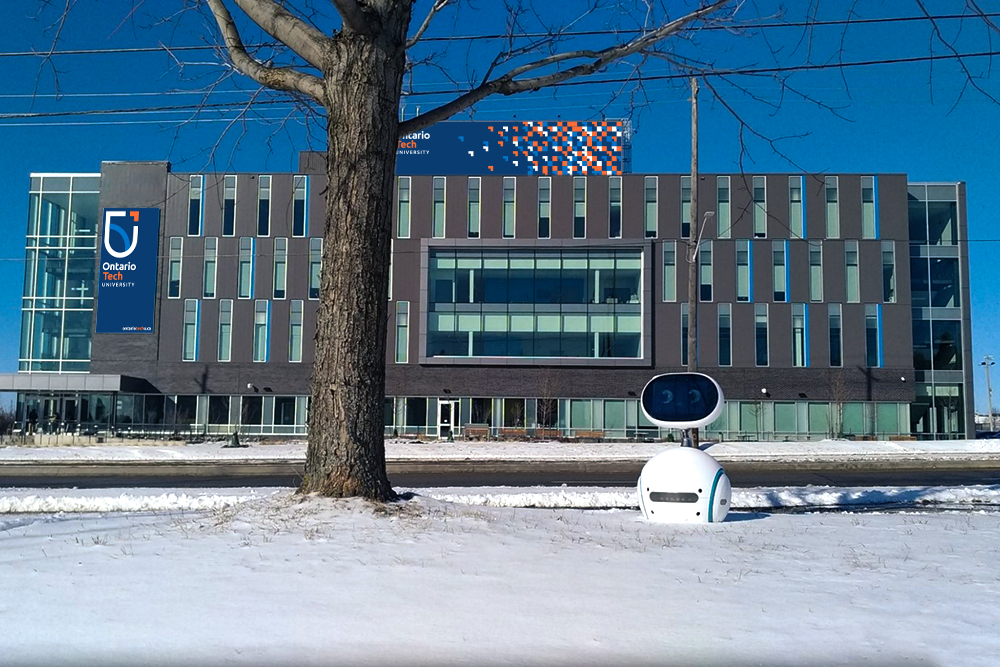You’ve got a friend: Ontario Tech researchers developing companion robots to combat social isolation in seniors
February 27, 2020

Canada’s senior population is projected to grow by 68 per cent over the next two decades as ‘Baby Boomers’ (members of the large generation born between 1946 and 1964) continue to cross over the age-65 threshold. Canadians are also living longer than their predecessors; the average life expectancy in 2020 is now 82 years, according to Statistics Canada.
Despite its size, the older adult demographic is likely to include some of Canada’s loneliest people. Aging often brings difficult life changes: social circles begin to shrink as friends and loved ones pass away, and children grow up and become busy with their own lives. Physical changes and limitations (hearing loss, inability to drive) can also reduce older adults’ opportunities for social interaction. Feelings of loneliness and isolation can not only lead to mental health issues such as depression and anxiety, but can also increase the mortality rate of older people, harm the immune system and heighten the risk of stroke and cardiovascular disease.
Ontario Tech University researcher Patrick Hung, PhD, Professor, Faculty of Business and Information Technology (FBIT), has come up with a high-tech method to address the loneliness issue: through interaction with companion robots.
“Companion robots have great potential for delivering services that encourage positive changes in one’s behaviour and health,” says Dr. Hung. “These robots behave like natural social-interaction partners for human users; they have ‘human-like’ features such as speech, gestures and eye-gaze. Prior research shows that lonely people, especially those who live alone, attribute human characteristics or behaviour to companion robots, and experience greater engagement with a robot than they would with a disembodied interactive computer kiosk.”
Together with his team of researchers, Dr. Hung is programming robots such as ASUS’ Zenbo to support mindfulness-based stress reduction, a training program that takes a meditative approach to treat pain, illness, depression and stress.
The robots are programmed to ask users questions adapted from the University of California, Los Angeles Loneliness Scale, a 20-item measure that assesses how often a person feels disconnected from others. Users can respond to the questions verbally or by selecting answers from the robot’s touch screen.
“Mindfulness is the psychological practice of intentionally being fully present and accepting where we are in the moment, instead of overreacting or being overwhelmed about what is going on around us,” says Dr. Hung. “Research shows mindfulness helps relieve depression and anxiety among seniors by integrating the mind and body. Encouraging seniors to practice mindfulness and assess themselves daily also increases their levels of social interaction, which promotes well-being and healthy aging.”
The growing market demand for companion robots offers a unique opportunity for Canadian elderly-care providers to explore how they can use technology to support the aging population and alleviate some of the responsibilities of in-home caretakers by automating routine tasks.
“It is essential for society to proactively address social isolation, depression and anxiety, especially in independently living seniors,” says Dr. Hung. “The work we are doing with companion robots serves that need and helps lay the groundwork for future adaptation.”
Dr. Hung and his research team are also working with:
- Alvaro Quevedo, PhD, Assistant Professor, FBIT, and the Canadian National Institute for the Blind (CNIB) to explore related robotic applications for persons with vision impairments. The team is also investigating the integration of in-vehicle companion robots for truck drivers.
- Miguel Vargas Martin, PhD, Professor, FBIT, and Chai Lifeline Canada to program robot companions for sick children.
- Ontario Tech privacy and data protection expert Andrea Slane, PhD, and Isabel Pederson, PhD, Canada Research Chair in Digital Life, Media, and Culture, on a project that aims to give seniors a voice in the process of establishing privacy best practices for the new domain of senior-oriented social support technologies. Dr. Slane and Dr. Pedersen will discuss this research at an event in Toronto, Ontario on Thursday, March 12.



